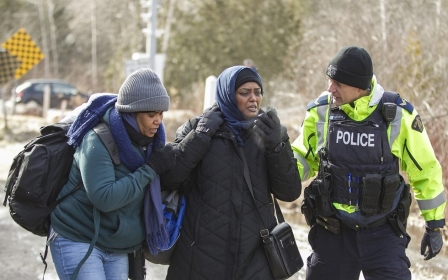Canada reports spike in asylum seekers from US
The Canadian government reported on Tuesday a spike of asylum seekers crossing the border illegally from the United States in the first two months of the year.
The Royal Canadian Mounted Police have intercepted 1,134 people at the border coming from the US in January and February, compared to 2,464 in all of 2016.
Deterred by the long bureaucratic process for claiming asylum in the United States and the anti-immigration rhetoric of US President Donald Trump, many migrants are opting to head northward. Once they are on Canadian soil, they can apply for asylum.
Asylum seekers are avoiding legal points of entry into Canada because of the Canada-US Safe Third Country Agreement, which forces refugee claimants to apply for protection in the first country they land, either the US or Canada.
Canada has also seen a surge in all refugee claims for the first two months of 2017, putting the country on track for the highest number since at least 2011.
Canada's federal government has taken heat from opponents on both the left and right for its wait-and-see approach to the influx. A Reuters/Ipsos poll found almost half of Canadians want people who entered the country illegally to be deported.
Statistics released by the government on Monday evening show 5,520 people made refugee claims in Canada in January and February.
If the pace of asylum-seekers keeps up, it will mean upwards of 33,000 refugee claims filed in Canada this year - almost 40 percent higher than 2016.
Gloria Nafziger, the refugee coordinator at Amnesty International Canada who had interviewed 30 refugee claimants, told Middle East Eye earlier this month that asylum seekers did not originally plan for Canada to be their final destination.
“All of the people we spoke to without fail were Muslim and all of them we spoke to without fail had never intended to come to Canada when they began their journeys,” Nafziger said.
“They all had the intention of going to the United States and working, living or claiming asylum in the United States.”
New MEE newsletter: Jerusalem Dispatch
Sign up to get the latest insights and analysis on Israel-Palestine, alongside Turkey Unpacked and other MEE newsletters
Middle East Eye delivers independent and unrivalled coverage and analysis of the Middle East, North Africa and beyond. To learn more about republishing this content and the associated fees, please fill out this form. More about MEE can be found here.




